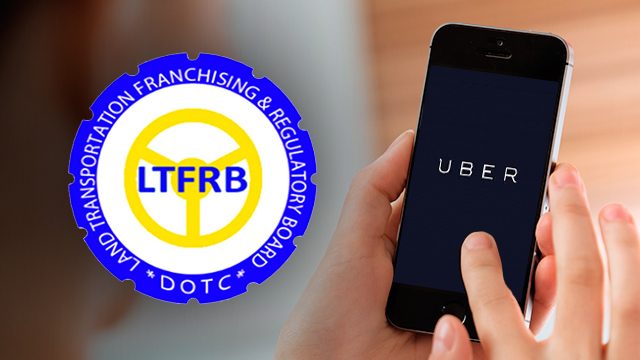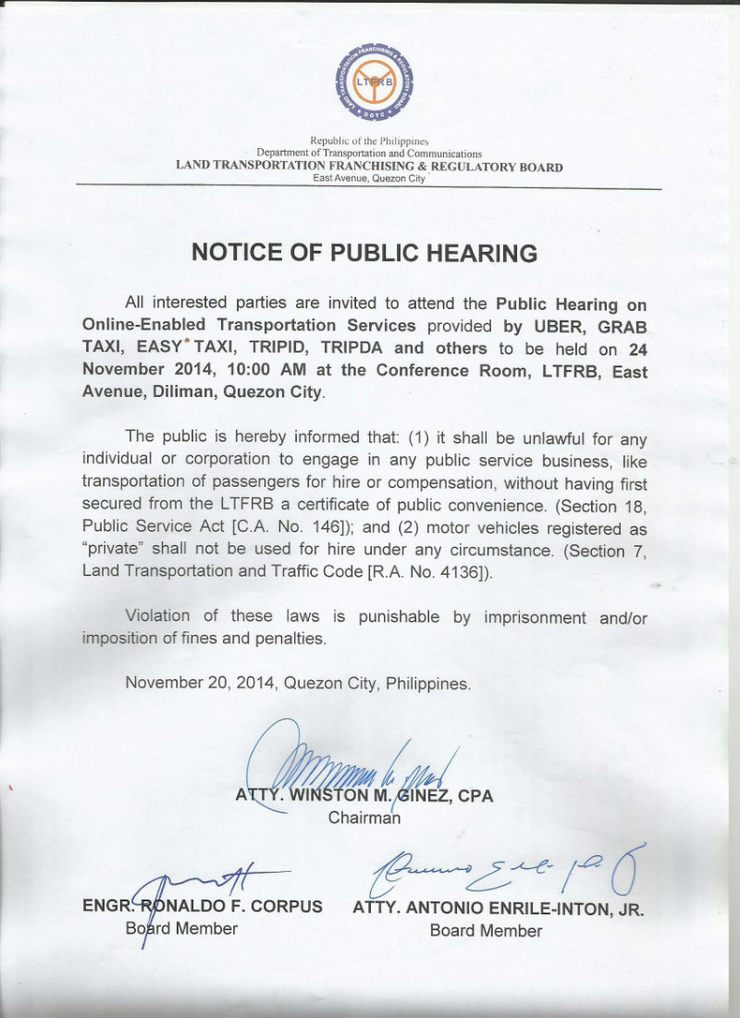SUMMARY
This is AI generated summarization, which may have errors. For context, always refer to the full article.

MANILA, Philippines – Are app-based services such as Uber engaged in “public service?” And if they are, how should government regulate them?
On Monday, November 24, the Land Transportation Franchising and Regulatory Board (LTFRB) will hold a public hearing on Uber and other similar “online-enabled transportation services.”
The hearing comes a month after one of Uber Philippines’ partner vehicles was caught in a sting operation led by the LTFRB. The operation, which caused outrage on social media, was prompted by a complaint from taxi operator-groups.
In almost every country it expands to, the service, which connects private vehicles to potential riders, has been met with resistance, typically by government-regulated transportation services.
European taxi drivers, for instance, staged a protest against Uber and similar apps in June. In Jakarta, government officials threatened to shut down the service over similar qualms.
Operators of transportation services under Philippine government regulation – such as taxis, airport taxis and “UV Express” – claim it’s “unfair” that Uber gets away with offering the same services while they have to go through strict requirements.

Although the LTFRB and the transportation department have since determined that Uber-partnered vehicles were “colorum” or illegal, LTFRB Chairman Winston Ginez admitted before a panel of lawmakers that government was exercising “tolerance” towards the company. (READ: Philippine congressmen want Uber to stop operations ASAP)
What’s clear is that it is “unlawful for any individual or corporation to engage in any public service business… without having first secured from the LTFRB a certificate of public convenience; and motor vehicles registered as ‘private’ shall not be used for hire under any circumstance.”
But when it comes to Uber itself, the LTFRB’s jurisdiction remains vague. Government has yet to decide if services like Uber can or should be placed under regulation.
“The reason why we would like to have a public hearing is that we are going to determine whether [Uber] is engaged in public service,” Ginez told Rappler in an earlier interview.
Question of law
“We’d like to know if [apps like Uber are] engaged in transportation or if they’re just a technology provider,” Ginez added.
Expected to appear during the Monday hearing at representatives from Uber, the National Telecommunications Commission, the Informations and Communications Technology Office, taxi groups, and commuters associations.
The question, as one lawmaker has pointed out, is about legality. Pasig Representative Roman Romulo during a hearing urged Ginez to bring in legal experts to determine the board’s jurisdiction.
Ginez, however, said there would be no need to invite legal experts since the board itself would be determining jurisdiction.
The LTFRB had earlier floated the possibility of asking Congress to pass a law specifically for apps similar to Uber, should the board find it has no jurisdiction.
The debate continues in most countries. In nearby Singapore, government has decided to regulate apps like Uber.
Controversies everywhere
The company has also been dragged into supposed privacy violations and controversial statements from its executives.
Lawmakers have also flagged Uber for operating in the country despite not being registered with the Securities and Exchange Commission. (READ: House asks: Uber, tax evader?)
The fuss over Uber is only one of many transportation issues hounding the Philippines. “Colorum” buses continue to be a major problem, especially in the country’s National Capital Region. (READ: How to tame Metro Manila’s buses)
Perhaps the most glaring of the country’s mass transportation woes is the Metro Rail Transit 3 (MRT 3), which cuts through EDSA boulevard, one of Metro Manila’s busiest thoroughfares. (READ: Abaya admits MRT-3 upgrade overdue)
Although taxis are plentiful in the metro, it is not uncommon to hear of cab rides gone wrong. (READ: Transporation chief to taxi operators: Uber should make you modernize, innovate)
The Japan International Cooperation Agency has estimated that traffic congestion costs the country around P2.4 billion daily in 2012. – Rappler.com
Add a comment
How does this make you feel?
There are no comments yet. Add your comment to start the conversation.